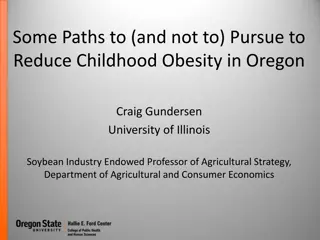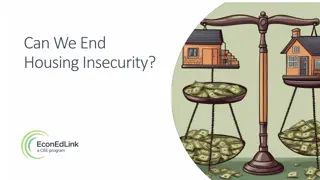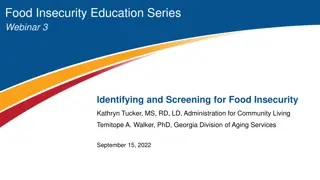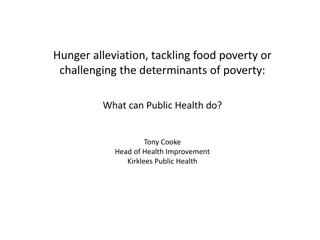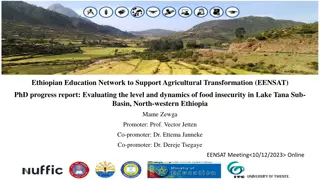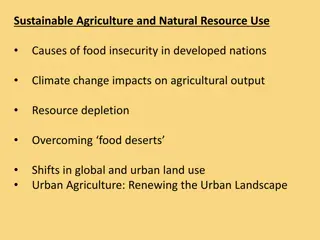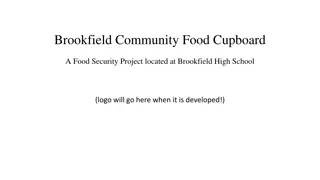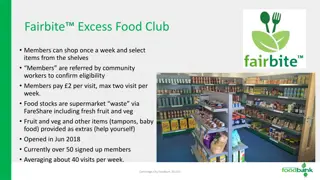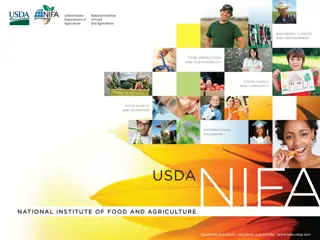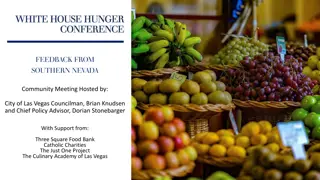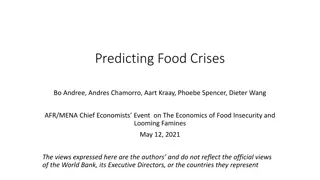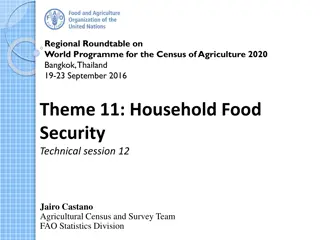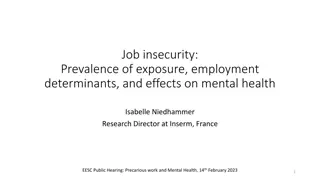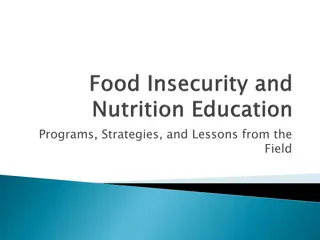Addressing Food Insecurity and Socioeconomic Challenges
Food insecurity and socioeconomic challenges persist in modern society, with organizations like the Joseph Rowntree Foundation shedding light on the struggles faced by many. Despite misconceptions about food banks, they play a vital role in supporting those in crisis, highlighting the need for a more comprehensive approach to tackle underlying issues. Low incomes, benefit problems, and unexpected life shocks often push individuals and families to seek assistance from food banks, emphasizing the importance of addressing the root causes of hunger and financial instability.
Download Presentation

Please find below an Image/Link to download the presentation.
The content on the website is provided AS IS for your information and personal use only. It may not be sold, licensed, or shared on other websites without obtaining consent from the author.If you encounter any issues during the download, it is possible that the publisher has removed the file from their server.
You are allowed to download the files provided on this website for personal or commercial use, subject to the condition that they are used lawfully. All files are the property of their respective owners.
The content on the website is provided AS IS for your information and personal use only. It may not be sold, licensed, or shared on other websites without obtaining consent from the author.
E N D
Presentation Transcript
I will start with a question Ray Hawley March 2017
In this day and age are they really necessary ? Ray Hawley March 2017
Joseph Rowntree Foundation Every year since 2008 the Joseph Rowntree Foundation has published its minimum income standard report. Members of the public are asked what goods and services they believe they need to ensure an adequate standard of living, and then JRF calculates how much you need to earn to reach this benchmark. As the cost of living has increased, the minimum income standard has risen but national income levels have not kept up. Today a single person on benefits earns less than 40 per cent of the minimum income standard, and families with children earn less than 60 per cent. It isn t only the unemployed or those on benefits struggling to make ends meet: up to a quarter of food bank users are in work. Despite a prevailing political rhetoric promising to support hard- working families 1,000,000 + people in Britain are on zero-hours contracts with no guaranteed work hours, according to the latest ONS figures; and the JRF income standard set at 16,300 a year for a single adult with no children in 2014 is higher than the minimum wage and almost 5,000 higher than the average salary .
Main drivers of foodbank usage remain benefit problems and low income Latest figures published by The Trussell Trust show that foodbank use remains at record levels, rising two percent on last year. 1,109,309 three day emergency food supplies were provided to people in crisis by the charity s network of 424 foodbanks in the 2015/16 financial year, compared to 1,084,604 in 2014/15. Of this number, 415,866 went to children. For the first time, The Trussell Trust has also partnered with the University of Hull to develop new tools that help us better understand the drivers of foodbank use, and areas of greatest need, by mapping foodbank data against census data. The early findings of this new research reinforce the trends seen by foodbanks related to benefits problems and low income.
Common Misconceptions Foodbanks only provide food We provide a lot more than food; that s because we recognise that tackling hunger also means tackling the underlying cause of the crisis. Our first concern is to signpost people to local agencies and charities who help people break out of the crisis they are in.
Foodbanks are only used by people who dont know how to budget When a situation changes unexpectedly and if you have no money as a result of a crisis, it s very difficult to budget. People on low incomes are often very innovative in managing extremely low budgets. But when a life shock from an outside source like an unexpected bill or redundancy hits, there is no breathing space to cushion family finances and a crisis occurs very quickly.
You cant use a foodbank if you work Anybody can be in need of emergency food; there is no one type of person who goes to a foodbank. We have seen working families on low incomes who are thrown into crisis when something like an unexpected bill hits; when a crisis hits someone in low paid or insecure work they often have no financial safety net.
People go to foodbanks to get free food, so they can spend their money on junk food and cigarettes. Edwina Currie used this argument last year. But going to a foodbank is a last resort when all other coping strategies have been exhausted. It takes courage to admit you cannot feed your family. People wait on the other side of the road for half an hour, or stand outside in the cold, before finally walking through the foodbank door. One young woman who used our foodbank recently said going to a foodbank was very emotional for me. It s not something you do lightly, many people break down in tears when they come in. I feel I have failed she said The stark reality is that without foodbanks people go hungry, and foodbanks prevent people from turning to extreme measures such as shoplifting in order to eat.
Foodbanks cause dependency As an independent foodbank provider we don t think anyone should need to be dependent on long term food aid. That s why our foodbank helps people out of crisis long term rather than just giving food. We look at each client on an individual basis. Due to the complexities of problems some need more assistance than others. We work with local agencies and charities to make a plan to help that person back onto their feet. However, we are not an alternative shopping source and closely monitor our clients progress regarding each individual case.
Some of the reasons why Foodbanks ? No choice when deciding sanctions, either black or white decisions. The Government intends to cut a further 3bn from the welfare bill by 2020. Main drivers of foodbank usage remain benefit problems and low income Food banks also reported that insecure work arrangements and high living costs were key drivers of food poverty. The APPG on Hunger report found that, according to the latest figures, the poorest households require 41 per cent of their income to cover the costs of food, fuel and housing; an increase of ten percentage points since 2003. The group, led by Labour MP for Birkenhead Frank Field, also found worrying levels of hunger being reported at schools. A survey circulated to 19 schools in Birkenhead and 13 in South Shields uncovered two institutions where staff reported one in five children were arriving at school hungry. Note Ronnie
This is our aim. How
How we did 2016 and to date 2017 500 400 300 200 100 0 2016 total 470 2016 Adults 298 2016 2017 Total 82 2017 Adults 53 Children 172 2017 Children 28
Over 1500 clients since we started How many food parcels would you think we have issued since day one ? And all carried down two flights of stairs By our ( now ) really fit team !!
Besides food we also help with Gifts at Christmas and birthdays or special occasions. Help with clothing and on and on and on. Where on earth does all this come from ? Simple easy answer is ( roll of drums ) .
If you didnt guess the answer is ALL OF US It takes an enormous effort to be able to fill 6,000 + bags of food. Not only that we have to maintain our stockroom so we can carry on doing what we do. How do we do it ? Last year we collected Harvest Festival donations from 13 schools, churches, play schools. We have collection boxes in the Co op, Deepcar, Oughtibridge and Stocksbridge surgeries. At least once per year we have a 3 hour collection spot in Waitrose in Sheffield. For the past 2 years we have had Christmas donations from Stocksbridge High School. This year the staff at Tata donated 100 food from Aldi.
We have faithful supporters here in our congregation who prefer to donate in monetary form. This is great for us as it enables us to buy the small items that people tend not to donate. Generally these are personal hygiene and feminine products. A new idea we have now is a credit account at Crawshaws. We had an initial donation of 150 and people are invited to leave any change from their shopping or to donate if they so wish. Working quite well and it enables us to issue frozen ready meals so our clients can get at least one hot meal easily without spending money on ingredients. I have not promoted this as such yet but keep your eye on Look Local. Not all our clients need only food. We have an agreement with the Bridge shop where we do not have to pay for clothing etc. Two of our team negotiated a fancy buggy for a family who desperately needed one. The shop did not charge us but our team members donated out of their own pockets. We have a superb team.
Christian Principles Our team has been with us from day 1. Really committed to being able to help families in need and generally going above and beyond the call of duty. Our clients have been really appreciative of what we do and on one occasion by even writing a glowing letter in Look Local. Last year less than 3% of our clients used our services more than 3 times. I only had to speak to 4 people regarding the number of times they visited. The CAB and Housing department have been our main referrers. Various depts such as mental health and Shelter have also used us on numerous occasions.
Biblical Quotations Out of curiosity I decided to Google what the Bible said about the giving of food. I have chosen the four that I think cover what our team believes in and does. We will be glad to answer any questions you may have after the next and last slide. Sorry, got to say it. I hope we have given you FOOD for thought !! Last and close
Hebrews 13:16 Do not neglect to do good and to share what you have, for such sacrifices are pleasing to God. Proverbs 22:9 Whoever has a bountiful eye will be blessed, for he shares his bread with the poor. Proverbs 19:17 The one who is gracious to the poor lends to the LORD, and the LORD will repay him for his good deed. Acts 20:35 In every way I showed you that by working hard like this we should help the weak and remember the words that the Lord Jesus himself said, It is more blessed to give than to receive. for such sacrifices are pleasing to God. Any Questions ? Final slide
In this day and age are they really necessary ? To answer the opening question We believe they are. Ray Hawley March 2017










